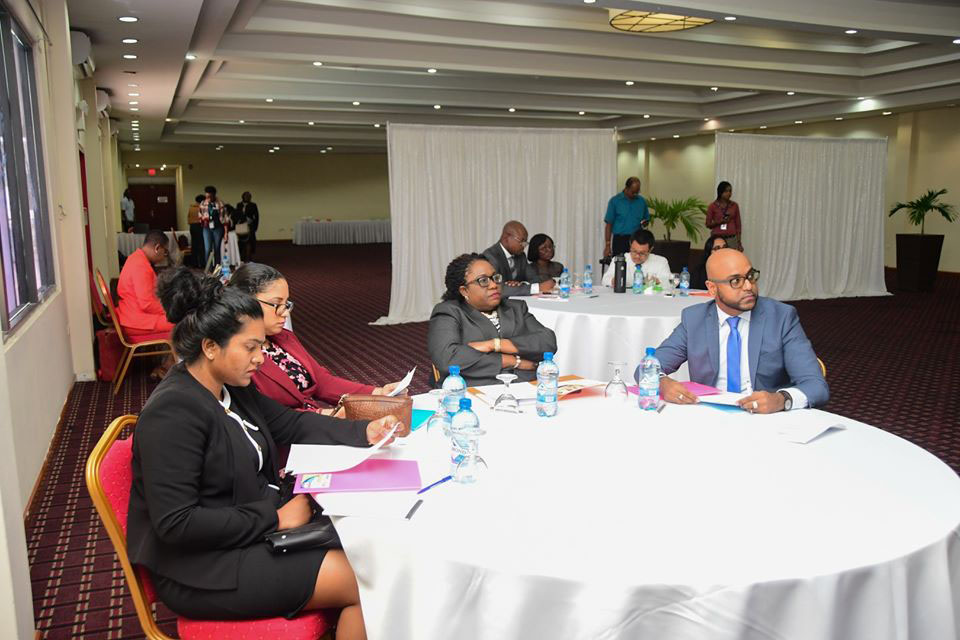Magistrates comprised the latest group yesterday to be guided on alternative sentencing options for juveniles to ensure that they could be rehabilitated and not become hardened criminals in jail.
The Juvenile Justice Depart-ment of the Ministry of Public Security in collaboration with the United States Agency for Inter-national Development (USAID) Community, Family, and Youth Resilience (CYFR) programme held a training session for magistrates across the country in Juvenile Justice Diversion and Alternative Sentencing (JJDAST).
The objective of the training which is facilitated by Crimino-logist and Certified Criminal Justice Specialist, Dr Dianne Williams is to build the capacity of participants so as to better implement diversion and alternative sentencing programmes.
To date, thirty-five civil society core groups have received this training from which a cohort will be drawn to support diversion programming in the ten administrative regions.
Delivering remarks at the opening of the training which was held at the Ramada Princess Hotel, Providence, East Bank Demerara, Minister of Public Security Khemraj Ramjattan said that the actualisation of the Juvenile Justice Act and structured justice for juveniles has taken a long time.
The Juvenile Justice Bill was introduced in parliament on March 15th, 2018. The house passed the bill the following month.
Ramjattan recalled that while debating the bill in Parliament, he had said that he doesn’t want Guyana to be a “jailhouse” nation.
“You just jail?… It must not be. We have to get modern, we have to get with the newer perspectives and philosophical underlying approaches about Juvenile Justice,” he said.
To do this, he said, a process has to begin to ensure there are alternatives to incarceration.
According to Ramjattan, the act provided for alternatives such as “very informal” procedures, restorative measures in certain sections ranging from an apology to compulsory attendance at a specified vocational or an educational centre, and from community service to compensation to the victim as much as the juvenile’s family or the juvenile himself or herself could afford.
He noted that a number of other aspects of diversions can come into play as a result of the innovative approaches that the magistrate takes.
“…And being learned in the law, I would hope that you are going to get as innovative as possible knowing that the entire purpose is not to jail or to mete out punishment that is going to be harsh because there is an underlying principle… (it) is that we damage the lives of young people and make them even more with that tendency to criminalise if we do not treat them properly at that young age when they would have met some unfortunate incident,” Ramjattan explained.
“It is not necessarily going to be law that you are going to be involving here. It will be very much multi-disciplinary, multi-approach and you have to take into the context where the youth would have come from, the psychology—you probably can ask a couple of questions, so many things—but at the end of the day with information that you have, you make a decision that is going to be rehabilitating so that that person can be with a better perspective in life,” he added.
The act, he said, also makes provision for the abolishment of a number of offences, such as truancy and vagrancy as crimes.
“Not because you are poor you are going to suffer at the hands of some statute. We abolished all those,” Ramjattan said.
He told the gathering that his ministry will leave no stone unturned to ensure stakeholders become au fait and develop the capacity to execute their functions and duties.
“In every society no matter how young the offender, there is going to be a need to be very specific as to what should be the best method of dealing with that young person,” he said.
Director of Juvenile Justice William Orrin Boston explained to Stabroek News that there is sufficient statistical data to show that 96% of Juveniles who come into conflict or contact with the law could be rehabilitated.
Boston said one of the mandates of the Ministry of Public Security’s strategic plan is to provide a safer society. This process, according to Boston, can be a long one.
“When they come in contact with the law, we have to screen them using psychologists and so forth to determine what level of capability they possess and what is perhaps needed,” he explained.
He said a lot of times the focus is on the juveniles when the problem might be beyond them. “In most cases, for example right now, we find that that family in terms of the springboard has an impact also,” Boston said.
He noted that the Juvenile Justice Act stands on three pillars: rehabilitation, education and reintegration.
Boston said the Juvenile Justice programme looks at a comprehensive package that will lead to rehabilitation.










